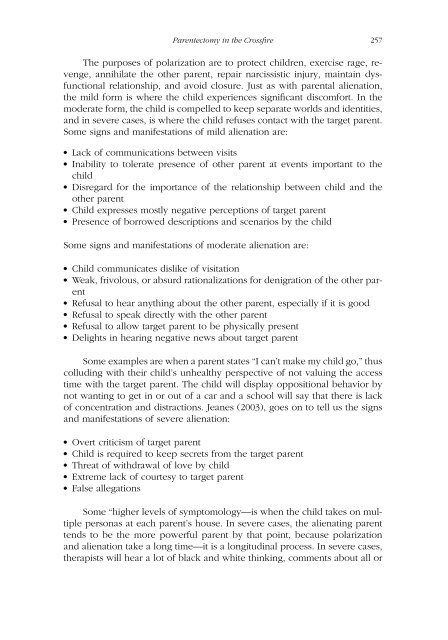Parentectomy in the Crossfire
Parentectomy in the Crossfire
Parentectomy in the Crossfire
You also want an ePaper? Increase the reach of your titles
YUMPU automatically turns print PDFs into web optimized ePapers that Google loves.
<strong>Parentectomy</strong> <strong>in</strong> <strong>the</strong> <strong>Crossfire</strong> 257<br />
The purposes of polarization are to protect children, exercise rage, revenge,<br />
annihilate <strong>the</strong> o<strong>the</strong>r parent, repair narcissistic <strong>in</strong>jury, ma<strong>in</strong>ta<strong>in</strong> dysfunctional<br />
relationship, and avoid closure. Just as with parental alienation,<br />
<strong>the</strong> mild form is where <strong>the</strong> child experiences significant discomfort. In <strong>the</strong><br />
moderate form, <strong>the</strong> child is compelled to keep separate worlds and identities,<br />
and <strong>in</strong> severe cases, is where <strong>the</strong> child refuses contact with <strong>the</strong> target parent.<br />
Some signs and manifestations of mild alienation are:<br />
� Lack of communications between visits<br />
� Inability to tolerate presence of o<strong>the</strong>r parent at events important to <strong>the</strong><br />
child<br />
� Disregard for <strong>the</strong> importance of <strong>the</strong> relationship between child and <strong>the</strong><br />
o<strong>the</strong>r parent<br />
� Child expresses mostly negative perceptions of target parent<br />
� Presence of borrowed descriptions and scenarios by <strong>the</strong> child<br />
Some signs and manifestations of moderate alienation are:<br />
� Child communicates dislike of visitation<br />
� Weak, frivolous, or absurd rationalizations for denigration of <strong>the</strong> o<strong>the</strong>r parent<br />
� Refusal to hear anyth<strong>in</strong>g about <strong>the</strong> o<strong>the</strong>r parent, especially if it is good<br />
� Refusal to speak directly with <strong>the</strong> o<strong>the</strong>r parent<br />
� Refusal to allow target parent to be physically present<br />
� Delights <strong>in</strong> hear<strong>in</strong>g negative news about target parent<br />
Some examples are when a parent states “I can’t make my child go,” thus<br />
collud<strong>in</strong>g with <strong>the</strong>ir child’s unhealthy perspective of not valu<strong>in</strong>g <strong>the</strong> access<br />
time with <strong>the</strong> target parent. The child will display oppositional behavior by<br />
not want<strong>in</strong>g to get <strong>in</strong> or out of a car and a school will say that <strong>the</strong>re is lack<br />
of concentration and distractions. Jeanes (2003), goes on to tell us <strong>the</strong> signs<br />
and manifestations of severe alienation:<br />
� Overt criticism of target parent<br />
� Child is required to keep secrets from <strong>the</strong> target parent<br />
� Threat of withdrawal of love by child<br />
� Extreme lack of courtesy to target parent<br />
� False allegations<br />
Some “higher levels of symptomology—is when <strong>the</strong> child takes on multiple<br />
personas at each parent’s house. In severe cases, <strong>the</strong> alienat<strong>in</strong>g parent<br />
tends to be <strong>the</strong> more powerful parent by that po<strong>in</strong>t, because polarization<br />
and alienation take a long time—it is a longitud<strong>in</strong>al process. In severe cases,<br />
<strong>the</strong>rapists will hear a lot of black and white th<strong>in</strong>k<strong>in</strong>g, comments about all or


